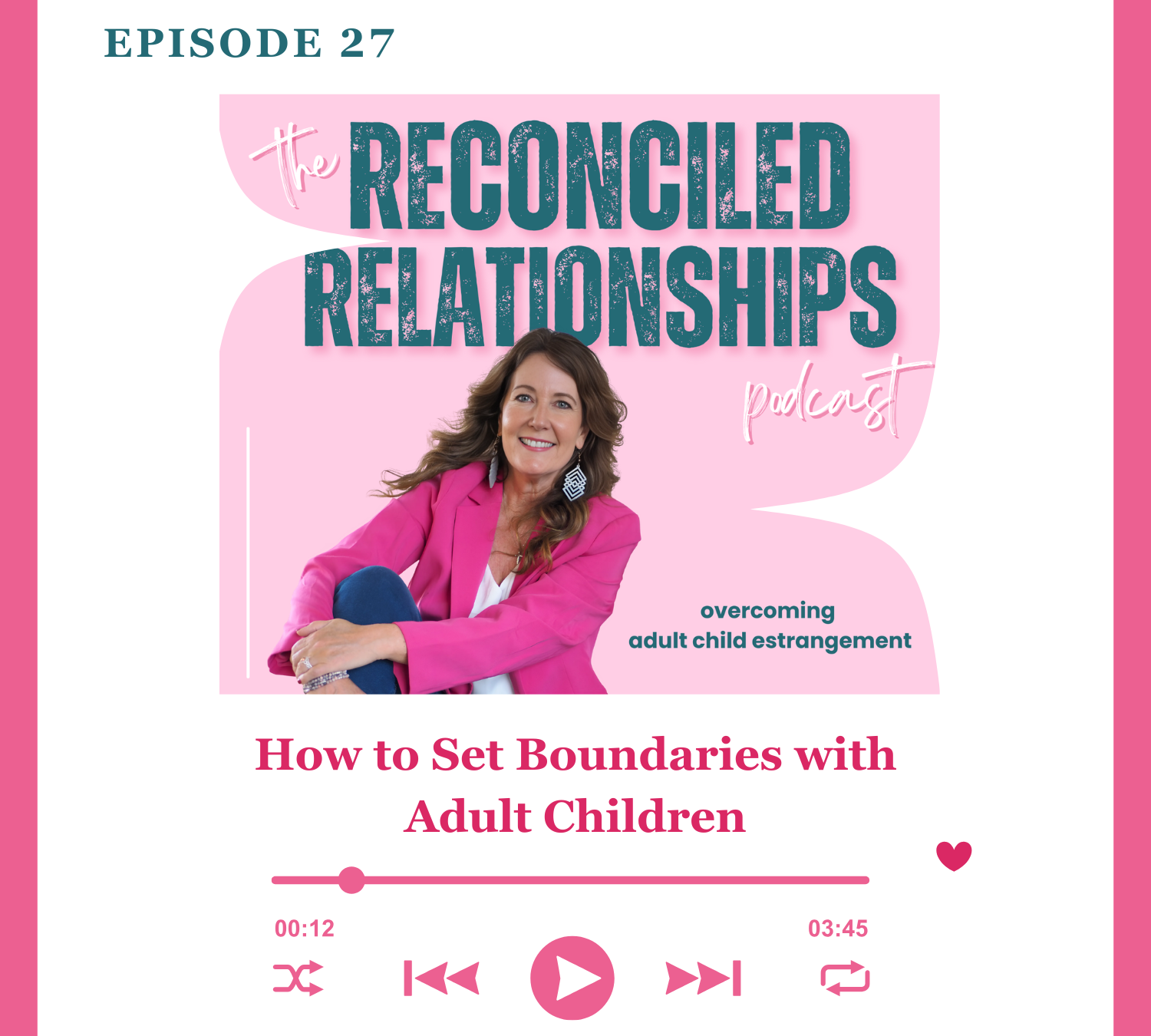WATCH THE EPISODE BELOW
LISTEN TO THE EPISODE BELOW
Are you afraid to set boundaries with your adult child for fear of losing the relationship entirely? In this episode, we dive into one of the most important tools for healing: boundary-setting.
Whether you’re fully estranged or just navigating high-conflict communication, setting clear boundaries—even at a distance—is a powerful way to protect your peace and maintain your self-respect.
You'll learn how emotional boundaries serve your mental health, why it's not your job to manage your child’s reaction, and how to communicate your needs clearly and lovingly.
This is about reclaiming your role, not as your child’s keeper, but as a whole person deserving of respect. Listen in as we explore how boundaries aren't walls, but bridges to healthier, more sustainable relationships.
KEYPOINTS FROM THIS EPISODE
-
Setting boundaries is often the first step toward healing strained relationships with adult children.
-
Boundaries can and should be set even if there is limited or no contact.
-
Emotional boundaries are crucial for mental health, self-respect, and empowerment.
-
Respect is non-negotiable—mothers must teach others, including their adult children, how to treat them.
-
Communicating boundaries with clarity and consistency is essential.
-
Follow-through on consequences is what gives boundaries their power.
QUOTABLE MOMENTS
- "You’re teaching them how to treat you—just like anyone else in your world."
- "Boundaries protect both your peace and your relationship in the long term."
- "Their response is not your responsibility."
- "If you’re not ready to follow through with consequences, then don’t set the boundary."
TRANSCRIPT OF THIS EPISODE
00:00:00 Are you feeling pushed to your limits but scared to push back? Very common. So let's talk about setting boundaries without losing connection. So we need to learn how to set boundaries. And for some of you, this might be the very first step in healing your relationship, right? If you have not become fully estranged from your child, sometimes setting boundaries in love is exactly what you need to do. So right now, you're probably feeling like every conversation turns into a conflict. If you're in communication with your child,
00:00:34 we need to set these boundaries so that that will protect you and your relationship long -term. So let's dive into a couple of these. The first is boundaries at a distance. Sometimes we need to realize that setting boundaries, even if you're not in communication or if there's little or no contact at all, either way, with your adult child, it's still important to set these. It's about defining what you are willing to accept and under what conditions you would engage or re -engage with them. Each of your family's
00:01:13 different, your situations are different, only you know what that feels like. So some of you have written a letter or an email to communicate these at some point, and I'm not saying that that's the answer, not always the answer, especially up in the beginning. But what I do know is that when you initiate boundaries, even from a distance, even when you're doing it for yourself, you're doing it for your own mental health, you're doing it for your own physical health, and whatever's going on in your family,
00:01:45 some lines in the sand sometimes need to be drawn, right? Even if it's just internally what you know to be true. Okay, number two is self -care and emotional boundaries. And that is because we... You really need to understand the need for emotional boundaries because that is going to protect your mental health. And that is the one and only purpose for this boundary, right? Self -care is a huge piece of it, but we call it an emotional boundary because it's going to help you emotionally. And the purpose of it is really to lead to
00:02:20 personal empowerment for yourself and even more importantly, self -respect. So maybe you have a son or daughter that is being extremely disrespectful. And you're just not sure how to navigate it. You know, I can't promise how they're going to respond to your boundaries, but when you create these, you need to know that you're doing them in love and then their response is not your responsibility. So the self -respect or therefore lack of self -respect is what's happening to many of you. And that's why you feel
00:02:54 so defeated and you feel like you have no self -respect because you're allowing this. you're allowing it just because it's your adult child. So, you know, therefore, like I always say, you're teaching them how to treat you just like anyone else in your world. So we forget that sometimes when it's our own child. So taking care of you is also very, very important. For those of you that I have not talked with before and you have been on this journey, you've tried other things, you're trying to navigate, or maybe
00:03:25 you're going to be the mom that starts out and reaches out for help prior to being estranged, where you're still navigating some of this. If you're open and you're wanting to learn more about coaching, I'd love to talk with you. This is a consultation. It's not a coaching call. It's not a call just for advice. It's a consultation. I get to learn more about what you're going through. I get to share with you about my program and we can decide together what that looks like. Number three is recognizing the need.
00:03:56 Recognizing the need of the boundaries. Some of you are being manipulated, disrespected. You're stressed out over the relationship and you need to recognize that, wow, I need to create this boundary. Some of you are just at that point where there should be boundaries in any healthy relationship and you're finally realizing that. You're learning that. But especially with our kids. And you know why? Is because our roles have shifted. They're adults now. It's a level playing field. You're not their keeper, right?
00:04:27 Some of your kids are wanting you to be their keeper, but that's not your responsibility. And that's where a lot of this defiance comes in because they're expecting you to continue to do what you've always done for them. And maybe they've realized or hopefully you've realized by now that maybe you've done too much for them. But guess what? We can't go backwards and that's okay. But this will help you recognize the need for the boundary. And that's the whole goal here. And number four is how to communicate
00:04:56 with them. So when you communicate these boundaries to your adult child. You need to use I statements. Don't blame, don't criticize. You just need to be clear and concise and specific about what it is that is acceptable and what is not. So they know what they're dealing with, just like you deserve the same. And that's the biggest piece here because if you are not ready to follow through with consequences, then don't set the boundary. If the consequences are not followed through and they're not respected, then don't bother setting a boundary
00:05:29 if you're not willing to follow through. I know that can be hard. We're gonna talk more about that in the upcoming videos because this topic overall boundaries is extremely important and relevant to so many of you. And I've been talking to a lot of you lately, bringing this specific subject up a lot. So I will see you in the next video. God bless.



